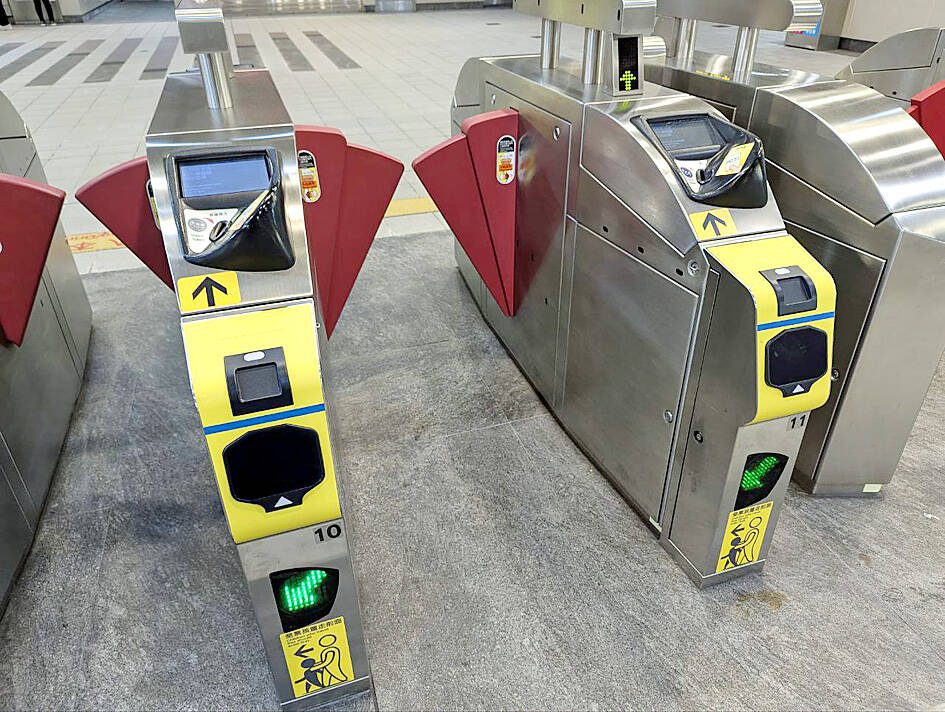New ticketing gates for the Taipei metro system are expected to begin service in October, allowing users to swipe with cellphones and select credit cards partnered with Taipei Rapid Transit Corp (TRTC), the company said on Tuesday.
TRTC said its gates in use are experiencing difficulty due to their age, as they were first installed in 2007.
Maintenance is increasingly expensive and challenging as the manufacturing of components is halted or becoming harder to find, the company said.

Photo: Lin Cheng-hung, Taipei Times
Currently, the gates only accept EasyCard, iPass and electronic icash tickets, or one-time-use tickets purchased at kiosks, the company said.
Since 2023, the company said it has invested NT$453 million (US$13.7 million) in redesigning the software system used by the gates.
Once implemented, the new system would allow people to swipe in and out of stations using phones with Apple Pay, Google Pay or Samsung Pay, it added.
The company is also working with Line Pay, JKOS Network, iPass Money, PX Pay Plus, EasyWallet, icash Pay, Taiwan Pay, Taishin Pay and others to allow people to swipe QR codes for faster boarding and alighting.
A total of 1,396 ticketing gates across 117 stations would be replaced with the new software, the TRTC said.
As of November last year, the company had already updated 639 ticketing gates, and is expected to complete upgrades by March, giving the company a grace period of six months to test the system and ensure it is compliant with the Payment Card Industry Security Standard.
The company said it plans to replace primary components to extend the overall service life of ticketing gates, increase maintenance efficacy and avoid situations in which maintenance is impossible due to a lack of components.
Separately, Taipei City Councilor Lin Liang-chun (林亮君) on Tuesday said that the Taipei City Government should review public transportation ticketing systems and allow automatic top-ups such of payment methods.
Lin said the public has long complained that buses in Taipei and New Taipei City were less than convenient, as the auto top-up function allegedly does not work on ticketing systems, or did not allow payment by QR code.
Lin said 150,000 people rode buses using cobranded cards, and about 4,000 experienced difficulty paying because the systems did not recognize the cards’ auto top-up functions.
Buses in Taipei and New Taipei City also lack the newer ticket verification systems employed by Kaohsiung and Taichung, Lin said, adding that upon further investigation, it was because buses in Taipei and New Taipei City did not have a camera installed on their verification system and was unable to scan QR codes.
Taipei Department of Transportation General Planning Division Director-General Liu Kuo-chu (劉國著) said that the municipal government is in talks with credit card companies to allow auto top-ups for EasyCards, iPasses and icash cards, and such systems could be implemented as early as next year.
The Taipei City Government plans to install systems with cameras that would allow the scanning of QR codes for payment, which would help foster willingness to ride on buses for travel to and from metro stations, Liu said.
Additional reporting by CNA

Chinese Nationalist Party (KMT) Chairman Eric Chu (朱立倫), spokeswoman Yang Chih-yu (楊智伃) and Legislator Hsieh Lung-chieh (謝龍介) would be summoned by police for questioning for leading an illegal assembly on Thursday evening last week, Minister of the Interior Liu Shyh-fang (劉世芳) said today. The three KMT officials led an assembly outside the Taipei City Prosecutors’ Office, a restricted area where public assembly is not allowed, protesting the questioning of several KMT staff and searches of KMT headquarters and offices in a recall petition forgery case. Chu, Yang and Hsieh are all suspected of contravening the Assembly and Parade Act (集會遊行法) by holding

PRAISE: Japanese visitor Takashi Kubota said the Taiwanese temple architecture images showcased in the AI Art Gallery were the most impressive displays he saw Taiwan does not have an official pavilion at the World Expo in Osaka, Japan, because of its diplomatic predicament, but the government-backed Tech World pavilion is drawing interest with its unique recreations of works by Taiwanese artists. The pavilion features an artificial intelligence (AI)-based art gallery showcasing works of famous Taiwanese artists from the Japanese colonial period using innovative technologies. Among its main simulated displays are Eastern gouache paintings by Chen Chin (陳進), Lin Yu-shan (林玉山) and Kuo Hsueh-hu (郭雪湖), who were the three young Taiwanese painters selected for the East Asian Painting exhibition in 1927. Gouache is a water-based

Taiwan would welcome the return of Honduras as a diplomatic ally if its next president decides to make such a move, Minister of Foreign Affairs Lin Chia-lung (林佳龍) said yesterday. “Of course, we would welcome Honduras if they want to restore diplomatic ties with Taiwan after their elections,” Lin said at a meeting of the legislature’s Foreign Affairs and National Defense Committee, when asked to comment on statements made by two of the three Honduran presidential candidates during the presidential campaign in the Central American country. Taiwan is paying close attention to the region as a whole in the wake of a

OFF-TARGET: More than 30,000 participants were expected to take part in the Games next month, but only 6,550 foreign and 19,400 Taiwanese athletes have registered Taipei city councilors yesterday blasted the organizers of next month’s World Masters Games over sudden timetable and venue changes, which they said have caused thousands of participants to back out of the international sporting event, among other organizational issues. They also cited visa delays and political interference by China as reasons many foreign athletes are requesting refunds for the event, to be held from May 17 to 30. Jointly organized by the Taipei and New Taipei City governments, the games have been rocked by numerous controversies since preparations began in 2020. Taipei City Councilor Lin Yen-feng (林延鳳) said yesterday that new measures by